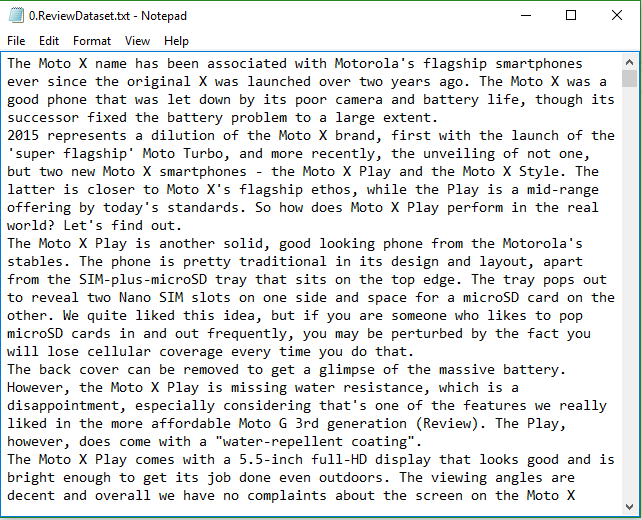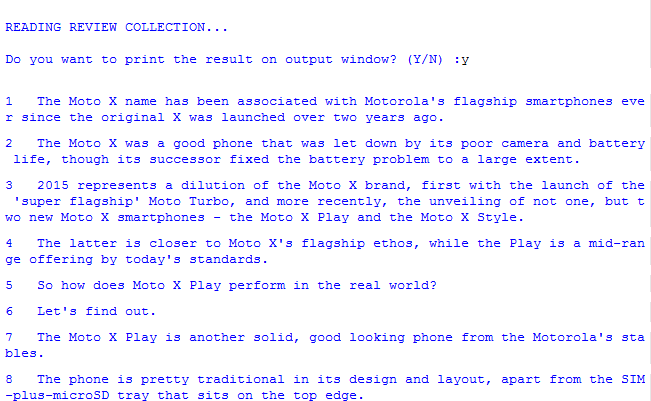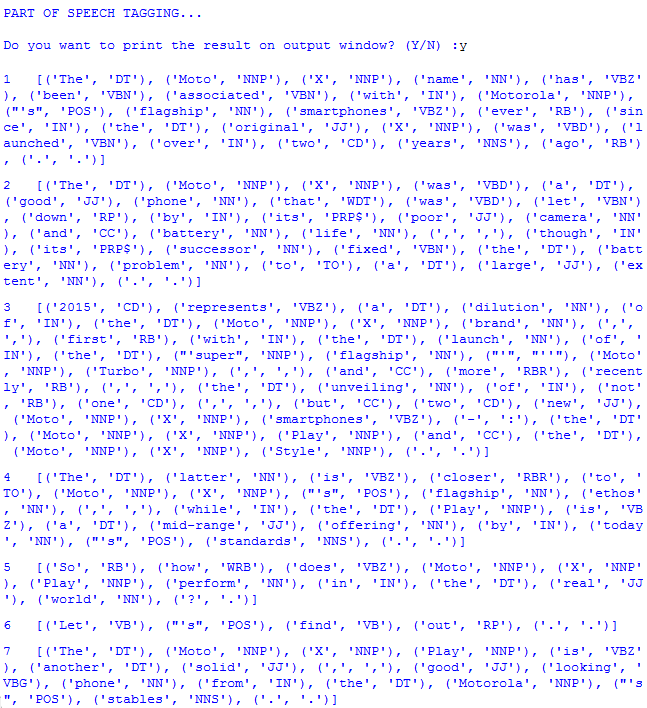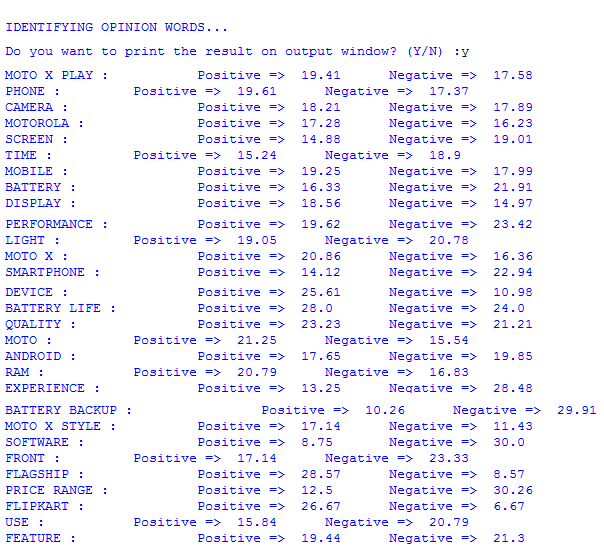Implementing Opinion Mining With Python
Learn about the process of opinion mining with Python through reviews of shopping sites like Amazon, Flipkart, and GSM Arena.
Join the DZone community and get the full member experience.
Join For FreeREVIEW COLLECTION
Input to the opinion mining process is the set of reviews. Following are the reviews of mobile “moto x play” downloaded from various shopping sites like Amazon, Flipkart, GSM Arena etc. The collected reviews are store in a database which are used for the Opinion Mining process.

FUNCTIONS
Following is the main function, i.e. entry point, to the Opinion Mining System (OMS) which calls the other subfunctions in “omsFunction package”.
File Name : oms.py
import omsFunctions
def printResultChoice():
userChoice = str(input('\nDo you want to print the result on output window? (Y/N) :'))
if(userChoice=='Y' or userChoice=='y'):
return True
else:
return False
#_FolderName='Data\\OppoF1\\'
_FolderName='Data\\MotoXPlay\\'
_ReviewDataset=_FolderName+'0.ReviewDataset.txt'
_PreProcessedData=_FolderName+'1.PreProcessedData.txt'
_TokenizedReviews=_FolderName+'2.TokenizedReviews.txt'
_PosTaggedReviews=_FolderName+'3.PosTaggedReviews.txt'
_Aspects=_FolderName+'4.Aspects.txt'
_Opinions=_FolderName+'5.Opinions.txt'
print("\nWELCOME TO OPINION MINING SYSTEM ")
print("-------------------------------------------------------------")
input("Please Enter any key to continue...")
print("\n\n\n\n\n\nPREPROCESSING DATA")
omsFunctions.preProcessing(_ReviewDataset,_PreProcessedData,printResultChoice())
print("\n\n\n\n\n\nREADING REVIEW COLLECTION...")
omsFunctions.tokenizeReviews(_ReviewDataset,_TokenizedReviews,printResultChoice())
print("\n\n\n\n\n\nPART OF SPEECH TAGGING...")
omsFunctions.posTagging(_TokenizedReviews,_PosTaggedReviews,printResultChoice())
print("\nThis function will list all the nouns as aspect")
omsFunctions.aspectExtraction(_PosTaggedReviews,_Aspects,printResultChoice())
print("\n\n\n\n\n\nIDENTIFYING OPINION WORDS...")
omsFunctions.identifyOpinionWords(_PosTaggedReviews,_Aspects,_Opinions,printResultChoice())PRE-PROCESSING
Pre-processing is done to improve accuracy of Data. It also avoids unnecessary data processing in each phase. It includes Remove Unnecessary Words (Like Oh!, OMG!, Smileys, hello guys, thanks, etc.) and Non Alphabetical characters.
File Name : omsFunctions.py
import nltk
import ast
import re
from nltk.tokenize import word_tokenize
from nltk.corpus import wordnet
from nltk.corpus import sentiwordnet
def preProcessing(inputFileStr,outputFileStr,printResult):
inputFile = open(inputFileStr,"r").read()
outputFile=open (outputFileStr,"w+")
cachedStopWords = nltk.corpus.stopwords.words("english")
cachedStopWords.append('OMG')
cachedStopWords.append(':-)')
result=(' '.join([word for word in inputFile.split() if word not in cachedStopWords]))
if(printResult):
print('Following are the Stop Words')
print(cachedStopWords)
print(str(result))
outputFile.write(str(result))
outputFile.close()The Function nltk.corpus.stopwords.words(“english”) returns some list of common stop words like:
['i', 'me', 'my', 'myself', 'we', 'our', 'ours', 'ourselves', 'you', 'your', 'yours', 'yourself', 'yourselves', 'he', 'him', 'his', 'himself', 'she', 'her', 'hers', 'herself', 'it', 'its', 'itself', 'they', 'them', 'their', 'theirs', 'themselves', 'what', 'which', 'who', 'whom', 'this', 'that', 'these', 'those', 'am', 'is', 'are', 'was', 'were', 'be', 'been', 'being', 'have', 'has', 'had', 'having', 'do', 'does', 'did', 'doing', 'a', 'an', 'the', 'and', 'but', 'if', 'or', 'because', 'as', 'until', 'while', 'of', 'at', 'by', 'for', 'with', 'about', 'against', 'between', 'into', 'through', 'during', 'before', 'after', 'above', 'below', 'to', 'from', 'up', 'down', 'in', 'out', 'on', 'off', 'over', 'under', 'again', 'further', 'then', 'once', 'here', 'there', 'when', 'where', 'why', 'how', 'all', 'any', 'both', 'each', 'few', 'more', 'most', 'other', 'some', 'such', 'no', 'nor', 'not', 'only', 'own', 'same', 'so', 'than', 'too', 'very', 's', 't', 'can', 'will', 'just', 'don', 'should', 'now', 'd', 'll', 'm', 'o', 're', 've', 'y', 'ain', 'aren', 'couldn', 'didn', 'doesn', 'hadn', 'hasn', 'haven', 'isn', 'ma', 'mightn', 'mustn', 'needn', 'shan', 'shouldn', 'wasn', 'weren', 'won', 'wouldn']
TOKENIZE THE REVIEWS
This function will read reviews from Text File. The Text Files consists of paragraphs. So the entire file will break into sentence. This sentence can individually use for mining.
File Name : omsFunctions.py (cont.)
def tokenizeReviews(inputFileStr,outputFileStr,printResult):
tokenizedReviews={}
inputFile = open(inputFileStr,"r").read()
outputFile=open (outputFileStr,"w")
tokenizer = nltk.tokenize.punkt.PunktSentenceTokenizer()
uniqueId=1;
cachedStopWords = nltk.corpus.stopwords.words("english")
for sentence in tokenizer.tokenize(inputFile):
tokenizedReviews[uniqueId]=sentence
uniqueId+=1
outputFile.write(str(tokenizedReviews))
if(printResult):
for key,value in tokenizedReviews.items():
print(key,' ',value)
outputFile.close()
Output

PART OF SPEECH TAGGING
Tagging is the process of assigning a part of speech marker to each word in an input text. Because tags are generally also applied to punctuation, tokenization is usually performed before, or as part of, the tagging process.
File Name : omsFunctions.py (cont.)
def posTagging(inputFileStr,outputFileStr,printResult):
inputFile = open(inputFileStr,"r").read()
outputFile=open (outputFileStr,"w")
inputTupples=ast.literal_eval(inputFile)
outputPost={}
for key,value in inputTupples.items():
outputPost[key]=nltk.pos_tag(nltk.word_tokenize(value))
if(printResult):
for key,value in outputPost.items():
print(key,' ',value)
outputFile.write(str(outputPost))
outputFile.close() Output

ASPECT EXTRACTION
Aspects are the important features rated by the reviewers. The aspects for a particular domain are identified through the training process. An aspect may be a single word or a phrase. In order to extract the aspect, searching of noun and noun phrases of the reviews are needed.
File Name : omsFunctions.py (cont.)
def aspectExtraction(inputFileStr,outputFileStr,printResult):
inputFile = open(inputFileStr,"r").read()
outputFile=open (outputFileStr,"w")
inputTupples=ast.literal_eval(inputFile)
prevWord=''
prevTag=''
currWord=''
aspectList=[]
outputDict={}
#Extracting Aspects
for key,value in inputTupples.items():
for word,tag in value:
if(tag=='NN' or tag=='NNP'):
if(prevTag=='NN' or prevTag=='NNP'):
currWord= prevWord + ' ' + word
else:
aspectList.append(prevWord.upper())
currWord= word
prevWord=currWord
prevTag=tag
#Eliminating aspect which has 1 or less count
for aspect in aspectList:
if(aspectList.count(aspect)>1):
if(outputDict.keys()!=aspect):
outputDict[aspect]=aspectList.count(aspect)
outputAspect=sorted(outputDict.items(), key=lambda x: x[1],reverse = True)
if(printResult):
print(outputAspect)
outputFile.write(str(outputAspect))
outputFile.close()IDENTIFYING OPINION WORDS AND THEIR ORIENTATION
Opinion words are the words which express opinion towards aspects. In the aspect-based opinion mining, the aspect related opinion words should be identified. The opinion words are mostly adjectives, verbs, adverb adjective, and adverb verb combinations. For each opinion word, we need to identify its semantic orientation, which will be used to predict the semantic orientation of each opinion sentence.
Negations should be handled appropriately to get the contextual information of a sentence. If the opinion word is in negative relation, then its priority score is reversed for negation handling purpose.
File Name : omsFunctions.py (cont.)
def identifyOpinionWords(inputReviewListStr, inputAspectListStr, outputAspectOpinionListStr,printResult):
inputReviewList = open(inputReviewListStr,"r").read()
inputAspectList = open(inputAspectListStr,"r").read()
outputAspectOpinionList=open (outputAspectOpinionListStr,"w")
inputReviewsTuples=ast.literal_eval(inputReviewList)
inputAspectTuples=ast.literal_eval(inputAspectList)
outputAspectOpinionTuples={}
orientationCache={}
negativeWordSet = {"don't","never", "nothing", "nowhere", "noone", "none", "not",
"hasn't","hadn't","can't","couldn't","shouldn't","won't",
"wouldn't","don't","doesn't","didn't","isn't","aren't","ain't"}
for aspect,no in inputAspectTuples:
aspectTokens= word_tokenize(aspect)
count=0
for key,value in inputReviewsTuples.items():
condition=True
isNegativeSen=False
for subWord in aspectTokens:
if(subWord in str(value).upper()):
condition = condition and True
else:
condition = condition and False
if(condition):
for negWord in negativeWordSet:
if(not isNegativeSen):#once senetence is negative no need to check this condition again and again
if negWord.upper() in str(value).upper():
isNegativeSen=isNegativeSen or True
outputAspectOpinionTuples.setdefault(aspect,[0,0,0])
for word,tag in value:
if(tag=='JJ' or tag=='JJR' or tag=='JJS'or tag== 'RB' or tag== 'RBR'or tag== 'RBS'):
count+=1
if(word not in orientationCache):
orien=orientation(word)
orientationCache[word]=orien
else:
orien=orientationCache[word]
if(isNegativeSen and orien is not None):
orien= not orien
if(orien==True):
outputAspectOpinionTuples[aspect][0]+=1
elif(orien==False):
outputAspectOpinionTuples[aspect][1]+=1
elif(orien is None):
outputAspectOpinionTuples[aspect][2]+=1
if(count>0):
#print(aspect,' ', outputAspectOpinionTuples[aspect][0], ' ',outputAspectOpinionTuples[aspect][1], ' ',outputAspectOpinionTuples[aspect][2])
outputAspectOpinionTuples[aspect][0]=round((outputAspectOpinionTuples[aspect][0]/count)*100,2)
outputAspectOpinionTuples[aspect][1]=round((outputAspectOpinionTuples[aspect][1]/count)*100,2)
outputAspectOpinionTuples[aspect][2]=round((outputAspectOpinionTuples[aspect][2]/count)*100,2)
print(aspect,':\t\tPositive => ', outputAspectOpinionTuples[aspect][0], '\tNegative => ',outputAspectOpinionTuples[aspect][1])
if(printResult):
print(outputAspectOpinionList)
outputAspectOpinionList.write(str(outputAspectOpinionTuples))
outputAspectOpinionList.close();
#-----------------------------------------------------------------------------------
def orientation(inputWord):
wordSynset=wordnet.synsets(inputWord)
if(len(wordSynset) != 0):
word=wordSynset[0].name()
orientation=sentiwordnet.senti_synset(word)
if(orientation.pos_score()>orientation.neg_score()):
return True
elif(orientation.pos_score()<orientation.neg_score()):
return False
Output

Opinions expressed by DZone contributors are their own.

Comments